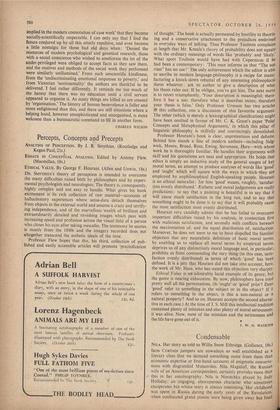Percepts, Concepts and Precepts
ESSAYS IN CONCEPTUAL ANALYS is. Edited by Antony Flew. (Macmillan, 18s.) ESSAYS IN CONCEPTUAL ANALYS is. Edited by Antony Flew. (Macmillan, 18s.) ETHICAL VALUE. By George F. Hourani. (Allen and Unwin, 18s.) DR. SMYTHIES'S theory of perception is intended to overcome the many difficulties raised bbth by philosophers and by experi- mental psychologists and neurologists. The theory is, consequently, highly complex and not easy to handle. What gives his book excitement is its rich collection of raw material—accounts of hallucinatory experiences where sense-data detach themselves from objects in the external world and assume a crazy and terrify- ing independence, and of the marvellous wealth of brilliant and extraordinarily detailed and ravishing images which pass with increasing speed and profusion across the visual field of a person who closes his eyes after taking mescalin. The testimony he quotes is mostly from the 1890s and the imagery recorded does not altogether transcend the aesthetic ideals of the time.
Professor Flew hopes that this, his third, collection of pub- lished and easily accessible articles will promote 'precisification
of thought.' The book is actually permeated by hostility to theoris• ing and a conservative attachment to the prejudices enshrined in everyday ways of talking. Thus Professor Toulmin complains at length that Mr. Kneale's theory of probability does not square with the ordinary meanings of words like 'probably' and 'likely.' What sport Totilmin would have had with Copernicus if be had been a contemporary : 'This man informs us that "The sun rises" has no use!' The only achievement which the editor is able to ascribe to modern language-philosophy is a recipe for manu- facturing a knock-down rebuttal of any interesting philosophical thesis whatever : ask its author to give a description of what his thesis rules out. If he obliges, you've got him. The next move is to retort triumphantly, 'Your description is meaningful; there- fore it has a use; therefore what it describes exists; ,therefore your thesis is false.' Only Professor Urmson has two articles ift this collection, one a discussion of this favourite argument. The other (which is merely a lexicographical classification) might have been omitted in favour of Mr. C. K. Grant's paper Polar Concepts and Metaphysical Arguments,' in which this pillar of linguistic philosophy is skilfully and convincingly demolished.
Professor Hourani's book is clear, unpretentious and definite. Behind him stands a line of modern authors—including Sidg- wick, Moore, Broad, Ross, Ewing, Stevenson, Hare—with whose work he is thoroughly familiar. He handles their arguments with skill and his quotations are neat and appropriate. He holds that ethics is simply an inductive study of the general usages of key moral terms, an attempt to produce analyses of words like 'good and 'ought' which will square with the ways in which -they are employed by unphilosophical English-speaking people. Hourani is an ethical naturalist : for him 'good' means, roughly, 'satisfac- tion evenly distributed.' /Esthetic and moral judgements are really predictions: to say that a painting is beautiful is to say that it will cause much satisfaction in the long run, and to say that something ought to be done is to say that it will probably cause the most ,satisfaction most evenly distributed.
Hourani very candidly admits that he has failed to overcome important difficulties raised by his analysis, in connection first with malicious satisfaction, and secondly with conflicts between the maximisation of, and the equal distribution of, satisfaction. Moreover, he does not seem to me to have dispelled the familiar objection that any naturalistic definition of basic moral terms, by enabling us to replace all moral terms by empirical terms, deprives us of any distinctively moral language and, in particular; prohibits us from commending the very thing (in this case, satis- faction evenly distributed) in terms of which 'good' has been defined. It is a pity that Hourani did not take into account, here, the work of Mr. Hare, who has stated this objection very sharplY, Ethical Value is an admirably lucid example of its genre; but the genre is nearing exhaustion. By now, philosophers have tried pretty well all the permutations. (Is 'ought' or 'good' prior? Does 'good' refer to something in the subject or in the object? If It refers to something in the object, is this a non-natural or a natural property? And so on. Hourani accepts the second alterna- tive in each case.) At the time of J. S. Mill this intellectual tradition contained plenty of mistakes and also plenty of moral seriousness; it was alive. Now, most of the mistakes and the seriousness and the life have gone out of it.
3. W. N. WATKINS










































 Previous page
Previous page